[Editorial] The Woman Who Cried Wolf: Ambiguity of Revenge in Violation (2021)
Spoiler alert. TW: Sexual assault and rape.
For decades upon decades, women across the globe have been screaming until their lungs collapse about the devastating experiences of sexual assault and rape they have endured. They have sat before powers of authority, and been subjected to cross-examination on whether or not they really were assaulted, and how much of that assault was supposedly brought on by themselves.
We have been victim-blamed for the way we dress, the things we say, where we walk… You could even go as far as to say for the foods we eat. Even in today’s modern society, one in which we have come so far, one that could be viewed as progressive, we still become entangled in the traps laid amongst society and chewed between the jaws of beasts, before being spat out back into the world with trauma scarred across our flesh like the wounds of an injured animal. But just because we are the victims of these crimes, this does not eradicate the instance that women too can be monsters with pointed teeth, awaiting for their prey to become ensnared in the trap before devouring a vulnerable life before them. There must be a way to distinguish between the wolves and the rabbits of this world, which is why Madeleine Sims-Fewer and Dusty Mancielli’s rape-revenge film, Violation, feels like an important commentary on how we draw the lines between good and evil.
Located within the depths of the forest, a small cabin awaits two sisters plus their husbands for a weekend getaway that will guarantee some much deserved rest and recuperation. Protagonist Miriam (Madeleine Sims-Fewer) and husband Caleb (Obi Abili), arrive in a placid state of martial tension which they easily bury beneath the faux smiles and friendly dialogue that they instill upon their company. Greta (Anna Maguire), the sister of Miriam, and her husband Dylan (Jesse LaVercombe) seem to exude the opposite within their marriage, playfully flirting with one another in a constant atmosphere that portrays a marriage soaked in happiness. As the foursome settle into their isolated weekend together, the dynamics of their entwined relationships become clearer, with Miriam and Caleb experiencing severe intimacy problems whilst Greta and Dylan glide through moments with an air of sheer bliss. But once the group shift partners, we become privy to a lingering sexual chemistry between Miriam and her sister’s husband Dylan, one that has historical context and has been an everlasting connection, only exacerbated when the two find themselves alone in the woods, experiencing profound moments such as being cleansed by the powerful spray of a waterfall. Yet the direction of this story takes an explosively emotive change of direction after one drunken night, leaving Miriam to meticulously seek revenge for the pain she has experienced after being sexually assaulted by Dylan.
The trope of rape revenge films is not one that is an easy landscape to navigate; any film that deals with triggering substance has some element of needing to be handled with caution - or does it? This subgenre, particularly popular within the horror sphere, has been exploited and manipulated for years and has given the audience some of the greatest and most shocking films to ever brace our screens. Meir Zarchi’s infamous I Spit On Your Grave 1978 presented rape in the most horrific instance with Jennifer Hills (Camille Keaton) graphically gang raped on multiple occasions, with the audience forced to witness every barbaric detail. However, Zarchi allows the audience a cathartic relief when Jennifer subverts her trauma into determination, seducing the men one-by-one in order to inflict acts of vengeance including a gruesome castration. In Abel Ferrera’s 1981 film Ms. 45, we watch as Thana (Zoë Lund) is subsequently raped twice within one day, showing that predators are constantly on the prowl and women cannot escape from these horrors, even in their own homes. Once again, the audience witnesses Thana exact revenge to become the patron saint of raped women as she takes down evil men. In Natalia Leite’s more recent feminist rape-revenge film, M.F.A 2017, we see as Noelle (Francesca Eastwood) is brutally raped by a fellow student at a party and how she goes on a vengeance-filled aftermath, exacting deaths that mimic rapes on the male rapists. Within this sub-genre of films, there is always a clear and defined process to the storyline; the catalyst of rape occurs, usually something which the audience witness in horrific detail and then, the victim of the attack rises from the flames to become an iconic powerhouse of retribution, delivering blow after blow of revenge onto the rapists, often soaked in carnage for a more visceral effect. Through this tried and tested formula, survivors of sexual abuse and rape have found a form of catharsis from what we see on screen, these films have become staple pieces for recovery and the empowerment after feeling devoid of having any control. However, Violation does not seek to hold the same power, it plays out in a completely alienated realm to the one moulded through the aforementioned films. Although it nestles itself comfortably into the rape-revenge genre, there is nothing justifiable about any of the actions, expowerment is devoid and it allows questions in regards to the narrative to arise, ones that would normally seem off-limits when it comes to such subject matter.
From the first instance, we expect that Miriam will be a reliable source of information and therefore that the words she speaks are completely gospel. Miriam presents as a relatable woman, one who is struggling with marital problems, most of which seem to stem from sexual problems and a lack of desirability between herself and husband Caleb. She glances painfully at her sister and Dylan playfully flirting, sensually touching one another through the materials of their clothes, allowing the audience to become personally entwined in her emotions and immediately understanding that the wrought atmosphere between herself and Caleb is due to a lack of intimacy. This presents the first problem in the narrative; not once are we given the opportunity to acknowledge Caleb’s perspective on why their marriage is dangling by a thread, and the reasons behind why he so feverishly and admittedly cannot bear to share a moment of intimacy with his wife. Caleb’s voice is completely silent throughout the entirety of the film, to the extreme point that after the events at the lake transpire, he is thrust from the screen without a second thought. This eradication from the screen portrays Miriam’s ease at abandoning her husband without a second thought, bringing to light the first complications regarding her narrative and the story she tells. It is not until Miriam and Dylan are alone in the woods that suspicion creeps in on whether or not that remorseful pained look she experienced earlier was due to a pressured sadness she felt regarding her marriage, or actually an embedded jealousy of her sister, due to the fact that Miriam believes she has an entitled connection to Dylan, something which is later reinstated when they spend the night by the fire, with Miriam stating how she believed they should have been together since high school. The way she behaves in the woods towards Dylan, insinuates that she could in actuality be the cause of the problems in her relationship with Caleb - without another sounding board of argument, it is difficult to say whether or not the problems stem from both of them, Caleb himself or the actions of Miriam. As the film progresses, events do not take place in a simple linear structure and instead we catch glimpses of the reality of that night through Miriam’s flashbacks. This nonlinear technique creates a haziness around the events of that night, forcing the audience, and Miriam, to confront how the scenes may have played out vastly differently for herself and Dylan, with only realisation coming later through a traumatic or repressed flood of memories, memories that are hard to distinguish when we can only see the scenario from the point of view of Miriam, who proves herself to be an unstable voice, one that can be heard from varying distances.
Before the audience and Miriam dissect the scenes of that night with Dylan, the extremity of action is forced upon us with an unflinchingly gruesome revenge sequence that will prove a struggle for many to sit through. The empowerment brought to the assaulted through revenge has become predominant feature within rape-revenge films, so well distinguished that it is almost unpalatable that seeking said vengeance on a predator would incite the opposite response, one that leaves questions on whether Miriam is the monster. Like leading a lamb to the slaughter, Miriam takes Dylan’s rope and guides him gently into his final moments, penetrating his trust, leaving him exposed and vulnerable to her inhumane actions without any room for reconciliation. The revenge seen on screen is brutally barbaric, with the blood being drained from this man’s slit throat, pouring into an ice-bucket at a steady pace, ready to be discarded without a thought for the actuality of these actions. The similarities between how Miriam discards any man that has wronged her, (with Caleb becoming eradicated from her life and story when it feels suitable for her), and Dylan being eradicated when he no longer fits into the constructs of the narrative she needs the outside world to bear witness to. The handling of the revenge is methodical, with a representation that allows Miriam to be seen as someone who has meticulously planned this desecration of the human body, but with the timeline construct in mind, this anal planning brings into question how long she may have had thoughts of disposing of a human body in this manner - whether Dylan’s or otherwise.
Violation forces the audience to confront the reality that awful scenarios can happen to awful people, and the consequences afterwards can often leave us feeling internally conflicted as to what is good and bad, and what justice should really mean. Even though Miriam’s narrative seems unreliable through the entirety of the film, there is no denying that the events whichunfold after the night by the fire, are sexual assault and rape. Sims-Fewer and Mancinelli have both experienced deep and profound abuse and trauma in their personal lives, and those life-altering scars are abundantly clear as this gut-wrenching scene plays out on screen. The rape itself is portrayed with moving realism; many films allude to sexual assault only ever being violent and visceral, yet in reality, sexual assault is often quiet, anasuming and timid. Watching rape sequences on screen gives even the most hardened of viewers the feeling of slowly sinking deeper and deeper into a state of depression, and Violation provides the audience with one of the most powerful yet agonising presentations of assault on screen, using classical tonality with an overbearing variety of shots that enable us to feel every sickening moment experienced by Miriam. Witnessing such a traumatic rape at the hands of someone trusted and close, even someone who could be considered family, evokes such a painful response of traumatic stress not only in Miriam but also in the audience, which is why the supposed ‘revenge’ that Miriam seeks on Dylan after this feels so contrived and conflicting, because our morally tuned compass cannot gauge the differences between traditional rights and wrongs, leaving us with a completely repressive response, one that personally left me in a state of confusion, seeking answers regarding Miriam’s narrative of the story, and leaving me in a questionable state of mind surrounding on the reality of these situations playing out.
Essentially what Sims-Fewer and Mancinelli have created is a film that forces the audience to confront the simplicity and complexity of revenge, and engage them in provocative thoughts on whether or not revenge should be something characters partake in. Regardless, the film does feel like it airs a sense of ambiguity, not around the rape, but around everything Miriam does and says to those around her. In one scene, we listen to Miriam as she describes a horrifying dream to Greta in which Greta was the subject matter, with Miriam discovering her hanging by her neck, choking and spluttering as she brutally suffocated to death. Although Greta is none the wiser, and merely remarks that her sister has problems, we as the audience know that the death described is almost identical to the prolonged and disturbing nature of Dylan’s death, with the life slowly choked out from him at the bare hands of Miriam. This serves as a stark reminder of Miriam’s psychotic nature; she consistently provokes her sister through abhorrent remarks, emotionally manipulates her, and makes choices in her life systematically in line with those that society deems as morally wrong. From the outset of Violation it is clear that Greta is desperately trying to find a space for Miriam in her life, but time and time again is proven right in her decision to chastise her sister from her life. As the two argue, Greta states ‘You created a reality that is completely different to everyone else’s, where you’re this saint that gets tricked into doing bad things’. The aesthetics throughout Violation corroborate this defined statement, with wide-sweeping woodland shots show inverted, insects flying in reverse and distorted timelines that flutter erratically. Is the reality in which this narrative plays out one that is only available within Miriam's mind? It could potentially be the unhinged, and untrustworthy dialogue from Miriam or perhaps it could be a representation of trauma, and how the world becomes a deformed alternate reality after going through an assault. However, everything points to the former as this convoluted narrative is present before the rape takes place.
The opening scene of Violation feels like a homage to Lars Von Trier’s Antichrist (2009), with the woods representing trauma, grief and both the loss and discovery of one’s self. In Von Trier’s film the audience are shown a fox which exclaims ‘Chaos reigns’ and implies that regardless of any grounding, the narrative of the story is rife with chaotic behaviour and a complex telling from unstable storytellers. Violation similarly opens as we watch a dark, brooding wolf devour a helpless, innocent rabbit without a second thought to the consequences of taking another life. It feels expected that Dylan is the wolf in this tale, however, when the film sharply ends after one of the most atrocious, malicious and repulsive acts of revenge, there seems to be no confusion as to who the real wolf in the story is, and that is not Dylan. Even though there is no ambiguity regarding the act of the rape itself, it feels as though Miriam might have cried wolf previously, with the consequences severely damaging the relationship she has with her female counterpart in Greta. Therefore when Miriam genuinely experiences sexual assault at the hands of a man she and her sister implicity trust, it becomes a case of disbelief for those around her, with her sister feeling as though she once more is using this as a form of escapism for the dishonourable behaviour she has exhibited, and crying that she has been ensnared within the jaws of the beast. Miriam is therefore victim to her own consequences, which leads to her gazing into the soul of the wolf in the woods and realising that she in fact, is the wolf and the characters in her narrative are the rabbits. Dylan’s actions are not justifiable, but neither are Miriam’s actions, and in some ways could be considered as more barbaric and animalistic than the sin committed by Dylan.
Violation is barbaric and primal in its depiction of both sexual assault and revenge, yet forceful in confronting the ambiguity of a narrative told by someone who is an untrustworthy source.
You can also watch the Interview with Violation (2021) directors Madeleine Sims-Fewer and Dusty Mancinelli



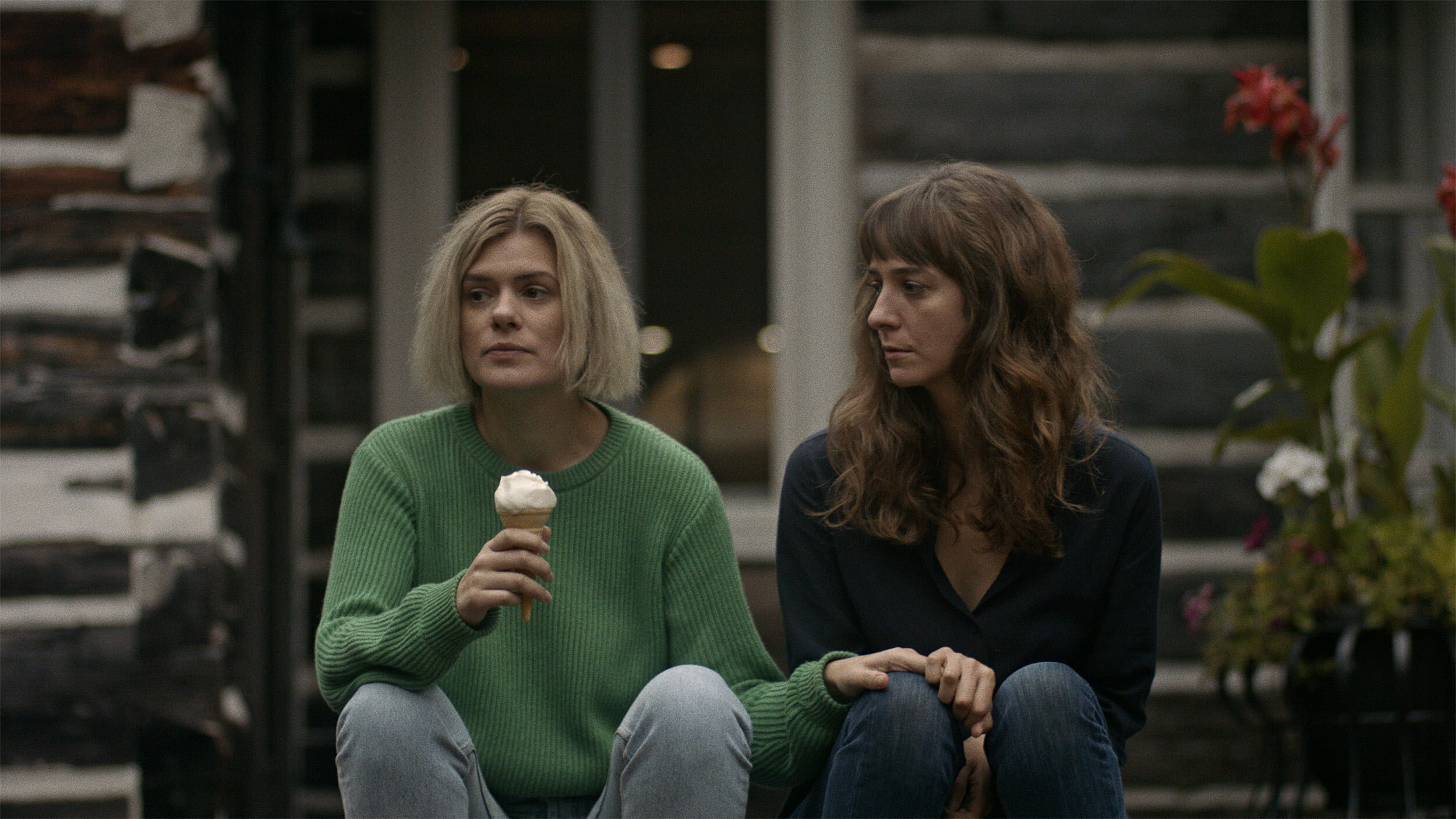
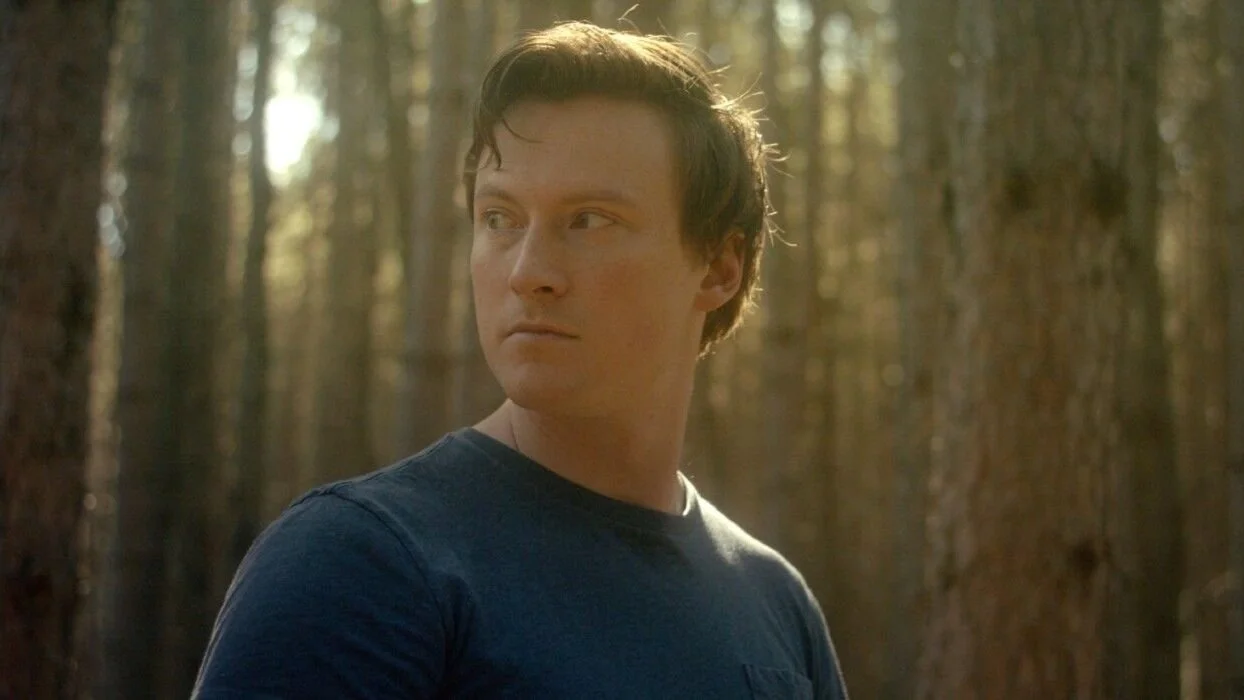
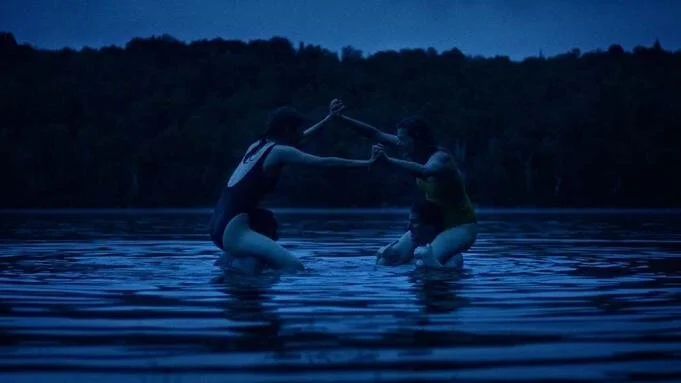

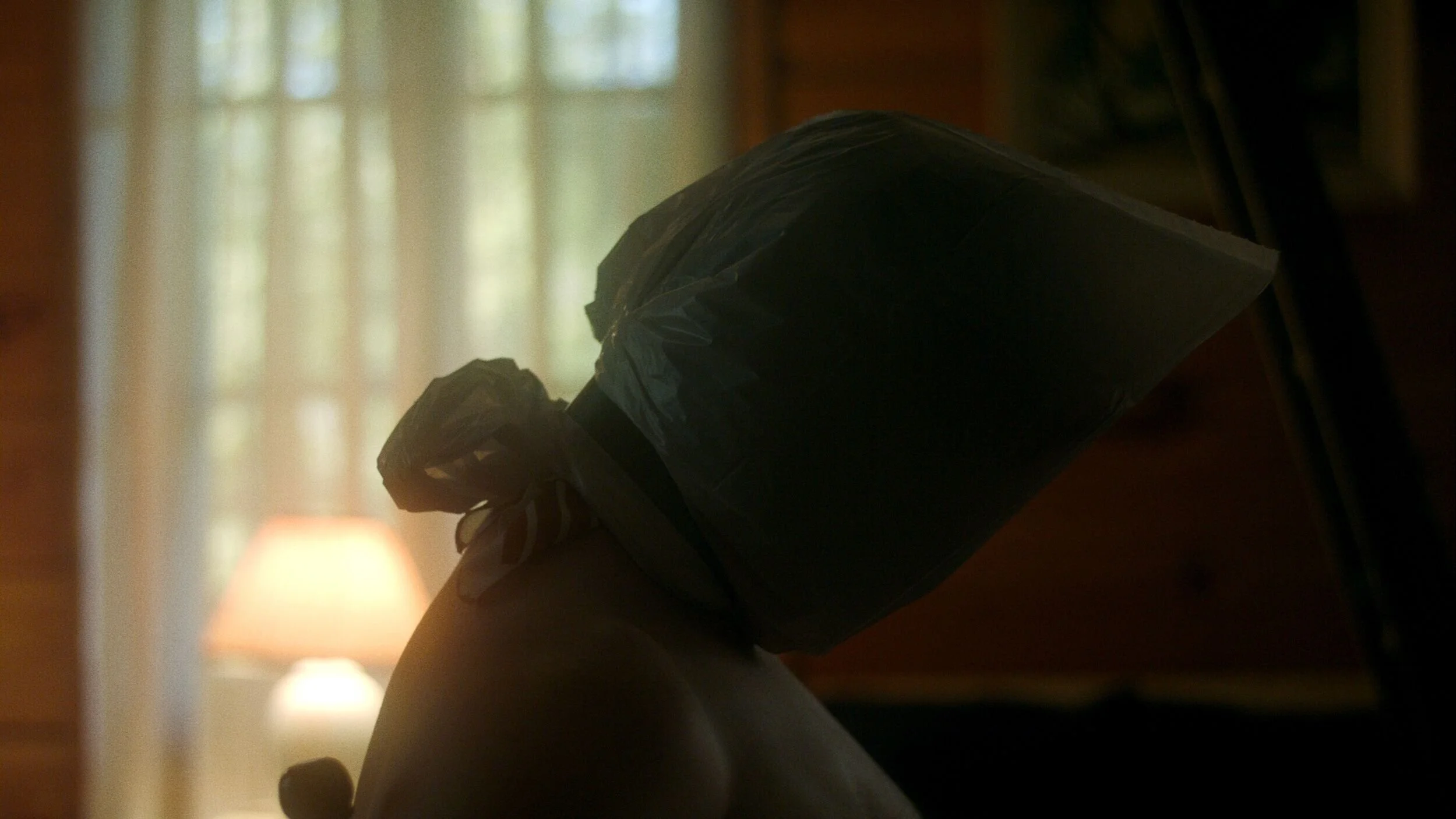
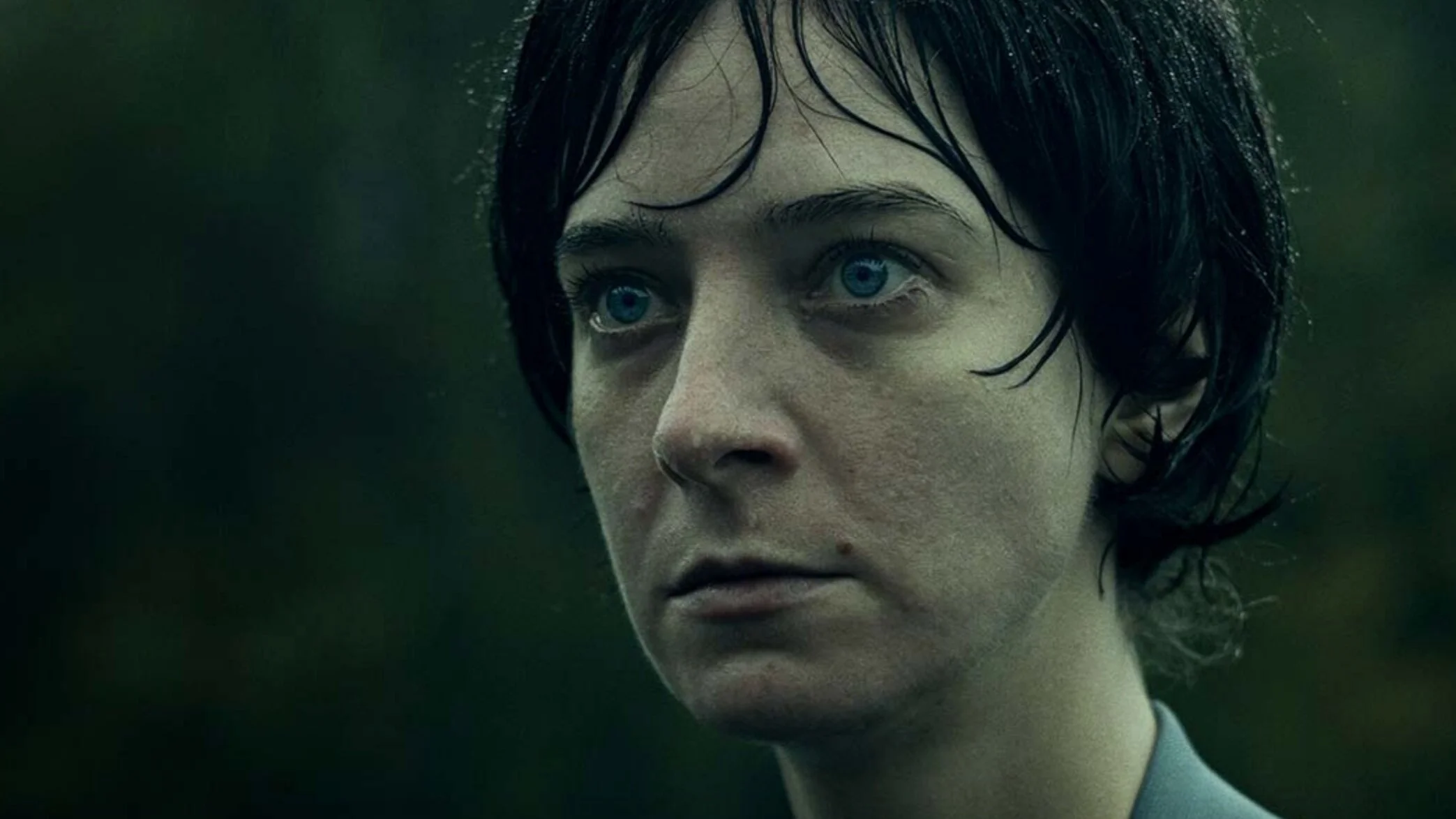























![[Editorial] “I control my life, not you!”: Living with Generalised Anxiety Disorder and the catharsis of the Final Destination franchise](https://images.squarespace-cdn.com/content/v1/5fe76a518d20536a3fbd7246/1696444478023-O3UXJCSZ4STJOH61TKNG/Screenshot+2023-10-04+at+19.30.37.png)
![[Editorial] Soho Horror Film Festival: Interview with Aimee Kuge on Cannibal Mukbang](https://images.squarespace-cdn.com/content/v1/5fe76a518d20536a3fbd7246/1701808004722-9M8SZ2UXY52QBQBR4NTI/img20230818_15150780.JPG)
![[Mother of Fears] Mothering in Silence in A Quiet Place (2018)](https://images.squarespace-cdn.com/content/v1/5fe76a518d20536a3fbd7246/1696445921315-HZJ2DZYQIH6VVWXBO2YL/Screenshot+2023-10-04+at+19.52.29.png)
![[Editorial] Mayhem Festival: Interview with Thomas Sainsbury on Loop Track (2023)](https://images.squarespace-cdn.com/content/v1/5fe76a518d20536a3fbd7246/1697186472899-WC4RR0TW7L7LMFEBGPA2/Tom+Sainsbury.jpg)
![[Event Review] Highlights from Mayhem Film Festival 2023](https://images.squarespace-cdn.com/content/v1/5fe76a518d20536a3fbd7246/1697624582491-MPT2VB9RRGU6OG7L6UKL/Mayhem+2023.jpg)
![[Editorial] 9 Horror Nintendo Switch Games To Play](https://images.squarespace-cdn.com/content/v1/5fe76a518d20536a3fbd7246/1697214470057-3XZXX8N4LYIMDFWS6Z3P/Screenshot+2023-10-13+at+17.20.13.png)
![[Editorial] 5 Female Focused Horror Book Recommendations](https://images.squarespace-cdn.com/content/v1/5fe76a518d20536a3fbd7246/1696441981361-52EQCTJ7AT2QF1927GM7/919xtm6d3fL._AC_UF894%2C1000_QL80_.jpg)
![[Editorial] 10 Films & Events to Catch at Soho Horror Film Fest 2023](https://images.squarespace-cdn.com/content/v1/5fe76a518d20536a3fbd7246/1700819417135-299R7L4P0B676AD3RO1X/Screenshot+2023-11-24+at+09.41.52.png)
![[Editorial] Keeping Odd Hours: A Retrospective on Near Dark (1987)](https://images.squarespace-cdn.com/content/v1/5fe76a518d20536a3fbd7246/1696445070868-HU9YIL3QPBCL1GW47R3Z/Screenshot+2023-10-04+at+19.36.53.png)
![[Editorial] Top 15 Female-Focused Mind Horror Films](https://images.squarespace-cdn.com/content/v1/5fe76a518d20536a3fbd7246/1691247166903-S47IBEG7M69QXXGDCJBO/Image+5.jpg)
![[Editorial] Top 15 Female-Focused Body Horror Films](https://images.squarespace-cdn.com/content/v1/5fe76a518d20536a3fbd7246/1689081174887-XXNGKBISKLR0QR2HDPA7/download.jpeg)
![[Editorial] Eat Shit and Die: Watching The Human Centipede (2009) in Post-Roe America ](https://images.squarespace-cdn.com/content/v1/5fe76a518d20536a3fbd7246/1691245606758-4W9NZWE9VZPRV697KH5U/human_centipede_first_sequence.original.jpg)
![[Editorial] Deeper Cuts: 13 Non-Typical Slashers](https://images.squarespace-cdn.com/content/v1/5fe76a518d20536a3fbd7246/1694951568990-C37K3Z3TZ5SZFIF7GCGY/Curtains-1983-Lesleh-Donaldson.jpg)
![[Editorial] 5 Slasher Short Horror Films](https://images.squarespace-cdn.com/content/v1/5fe76a518d20536a3fbd7246/1696358009946-N8MEV989O1PAHUYYMAWK/Screenshot+2023-10-03+at+19.33.19.png)
![[Editorial] If Looks Could Kill: Tom Savini’s Practical Effects in Maniac (1980)](https://images.squarespace-cdn.com/content/v1/5fe76a518d20536a3fbd7246/1694952175495-WTKWRE3TYDARDJCJBO9V/Screenshot+2023-09-17+at+12.57.55.png)
![[Ghouls Podcast] Maniac (2012) with Zoë Rose Smith and Iona Smith](https://images.squarespace-cdn.com/content/v1/5fe76a518d20536a3fbd7246/1696356006789-NYTG9N3IXCW9ZTIJPLX2/maniac.jpg)
![[Editorial] 8 Mind Horror Short films](https://images.squarespace-cdn.com/content/v1/5fe76a518d20536a3fbd7246/1693504844681-VPU4QKVYC159AA81EPOW/Screenshot+2023-08-31+at+19.00.36.png)
![[Editorial] Editor’s Note: Making a slash back into September](https://images.squarespace-cdn.com/content/v1/5fe76a518d20536a3fbd7246/1694354202849-UZE538XIF4KW0KHCNTWS/MV5BMTk0NTk2Mzg1Ml5BMl5BanBnXkFtZTcwMDU2NTA4Nw%40%40._V1_.jpg)
![[Editorial] 8 Body Horror Short films](https://images.squarespace-cdn.com/content/v1/5fe76a518d20536a3fbd7246/1690838270920-HWA5RSA57QYXJ5Y8RT2X/Screenshot+2023-07-31+at+22.16.28.png)
![[Editorial] Metal Heart: Body Dysmorphia As A Battle Ground In Tetsuo: The Iron Man (1989)](https://images.squarespace-cdn.com/content/v1/5fe76a518d20536a3fbd7246/1690190127461-X6NOJRAALKNRZY689B1K/Screenshot+2023-07-24+at+10.08.27.png)

![[Film Review] Perpetrator (2023)](https://images.squarespace-cdn.com/content/v1/5fe76a518d20536a3fbd7246/1695483561785-VT1MZOMRR7Z1HJODF6H0/Screenshot+2023-09-23+at+16.32.55.png)
![[Film Review] Sympathy for the Devil (2023)](https://images.squarespace-cdn.com/content/v1/5fe76a518d20536a3fbd7246/1697186986143-QDVLQZH6517LLST682T8/Screenshot+2023-10-13+at+09.48.52.png)
![[Film Review] Elevator Game (2023)](https://images.squarespace-cdn.com/content/v1/5fe76a518d20536a3fbd7246/1696440997551-MEV0YZSC7A7GW4UXM5FT/Screenshot+2023-10-04+at+18.31.42.png)
![[Film Review] Kill Your Lover (2023)](https://images.squarespace-cdn.com/content/v1/5fe76a518d20536a3fbd7246/1697465940337-T55VQJWAN4CHHJMXLK32/56_PAIGE_GILMOUR_DAKOTA_HALLWAY_CONFRONTATION.png)
![[Film Review] V/H/S/85 (2023)](https://images.squarespace-cdn.com/content/v1/5fe76a518d20536a3fbd7246/1697455043249-K64FG0QFAFVOMFHFSECM/MV5BMDVkYmNlNDMtNGQwMS00OThjLTlhZjctZWQ5MzFkZWQxNjY3XkEyXkFqcGdeQXVyMTUzMTg2ODkz._V1_.jpg)
![[Film Review] Shaky Shivers (2022)](https://images.squarespace-cdn.com/content/v1/5fe76a518d20536a3fbd7246/1696442594997-XMJSOKZ9G63TBO8QW47O/Screenshot+2023-10-04+at+18.59.33.png)
![[Film Review] Mercy Falls (2023)](https://images.squarespace-cdn.com/content/v1/5fe76a518d20536a3fbd7246/1695482997293-E97CW9IABZHT2CPWAJRP/Screenshot+2023-09-23+at+16.27.27.png)
![[Film Review] A Wounded Fawn (2022)](https://images.squarespace-cdn.com/content/v1/5fe76a518d20536a3fbd7246/1695484054446-7R9YKPA0L5ZBHJH4M8BL/Screenshot+2023-09-23+at+16.42.24.png)
